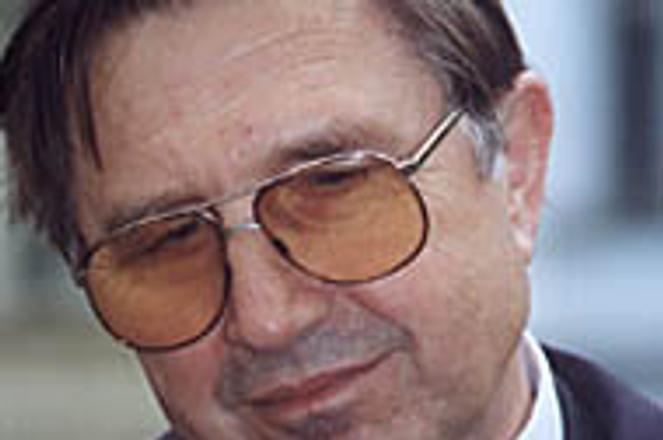Alojz Lorenc, former boss of Czechoslovakia's feared ŠtB state police, is now an IT consultant and is "doing quite well".photo: Ján Svrček
One of Slovakia's most infamous former communist leaders may escape prosecution. The Bratislava Military District Court (VOS) last week dropped criminal charges against Alojz Lorenc - the last communist State Security Bureau (ŠtB) boss - for crimes he allegedly committed against the state.
The October 3 decision to halt prosecution confirmed Slovakia's tradition as a country unwilling to criminally prosecute figures from its communist past. While the Czech Republic's Justice Ministry formed a department in 1991 to investigate communist crimes, Slovakia waited until November 1999 to form a similiar body; while the Czech department boasts 100 employees, Slovakia's lays claim to just two.
Those Slovaks who were persecuted by their former leaders say that the time has long since passed for the nation to finally get tough on the offenders. Former top ranking communists and members of the ruling coalition, however, maintain that they should not be investigated, saying that the "system" rather than specific individuals was responsible for any communist-era wrongdoings.
"My conscience is absolutely clean," Lorenc told The Slovak Spectator in a calm and decisive voice on October 10. "Maybe the orders I gave sometimes hurt innocent people, but I never intended to do harm to anyone. I don't feel guilty."
But those who were directly affected by the communist regime said that they were appalled by the VOS's decision. "It's ridiculous," said 71-year old Štefan Pauliny, the head of the Slovak Confederation of Political Prisoners (KPZS). "It's like the VOS is laughing straight into the face of justice and ethics."
"He [Lorenc] was the head of a criminal institution which spread terror and put many innocent people in prison," he continued. "And now we are told that he can't be punished."
Pauliny, who served 15 years in prison for treason under the communists starting in 1954, said that the court's decision was equally disturbing considering that the current leaders of the country - "those who are supposed to be our moral authorities" - had not protested the decision.
Far from protesting, the current government has stated that it would rather bury the past than go after communist figures.
"This theme [prosecuting former communists] doesn't appeal to Slovaks," said Slovak Prime Minister Mikuláš Dzurinda in an interview for the Slovak business weekly Profit. "Thank God that [era] is gone. Let's now dedicate ourselves to [the issues of] today and tomorrow."
At least one of Dzurinda's coalition party mates agrees with the PM. "We should draw a thick line behind all that and bury it in the past," said Ľubomír Andrassy, vice-chairman of the reformed communist Party of the Democratic Left (SDĽ). "Although no SDĽ members would have anything to fear if their pasts were inspected, we think it's more important to concentrate on the problems of today."
Such attitudes are welcomed by Lorenc (61), who headed the ŠtB from 1985 until 1989 and was sentenced to four years in prison in 1992 by the Czechoslovak VOS in Tábor for abusing the powers of a state authority from October 1988 to November 17, 1989. He was found guilty of having illegally detained dissenters against the crumbling communist regime.
Lorence spent one year in prison, but, as a Slovak, was allowed to return to his native soil following the split of Czechoslovakia in 1993. He then lived unnoticed by Slovak authorities until 1995 when he was again charged on the same counts.
Now, almost five years later, the court decided to halt the proceedings because, according to the ruling, it is against the law to sentence a person for the same crime twice.
Bohuslav Padrta, the head of the Bratislava VOS, said that the complicated Lorenc case may not be so easily dismissed. "The military prosecutor appealed against the ruling, so the case remains open. Because of the split of the [Czechoslovak] republic, this case has become legally very complicated," he said, adding that it was unclear if Lorenc would ever be jailed because the Czechoslovak court's verdict (which became valid in May 1993) may already have exceeded its statute of limitations.
Does anyone care?
While Lorenc's case trudges through the courts, political analysts said that the country's lacklustre efforts at punishing communist-era figures could also be seen in its poor attempts to prosecute criminals from independent Slovakia.
"Slovakia hasn't even dealt with the issue of independent Slovakia," said Soňa Szomolányi, a political analyst with Comenius University in Bratislava. "We haven't dealt with the communists nor with the crimes committed during the former government of Vladimír Mečiar."
"Because of the complicated legal disputes over these matters, people are resigned to the issues and don't want to follow the trials," she said. "They would rather concern themselves with more pressing problems of their own."
Ivan T., a 35-year old Bratislava resident, agreed. "I don't have the energy to follow these things," he said. "We should do our best to punish the new criminals like [former Secret Service boss Ivan] Lexa and all of Mečiar's boys. We should leave the old men alone. There are more important things to do."
Such attitudes infuriate former communist-era prisoners like Pauliny, while allowing former communist criminals like Lorenc to establish normal, even successful lives in modern Slovakia.
"As long as we don't declare openly that the communist regime was bad and morally damaging, Slovak society will never have its morals restored," Pauliny said.
As for Lorenc: "I co-own an IT consultating firm which deals with IT security. Yes... I'm doing quite well."


